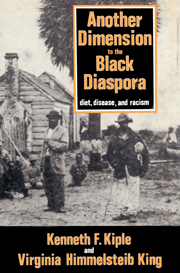Book contents
- Frontmatter
- Contents
- Preface
- Acknowledgments
- Part I African beginnings
- Part II Immunities: epidemiology and the slave trade
- Part III Susceptibilitie
- Part IV Antebellum medicine
- Introduction to Part IV
- 11 Slave medicine
- 12 Physicians versus the slaves
- Part V Sequelae and legacy
- Notes
- Bibliographic essay
- Index
Introduction to Part IV
Published online by Cambridge University Press: 26 March 2010
- Frontmatter
- Contents
- Preface
- Acknowledgments
- Part I African beginnings
- Part II Immunities: epidemiology and the slave trade
- Part III Susceptibilitie
- Part IV Antebellum medicine
- Introduction to Part IV
- 11 Slave medicine
- 12 Physicians versus the slaves
- Part V Sequelae and legacy
- Notes
- Bibliographic essay
- Index
Summary
One must first ask: to what extent did Southern practitioners achieve a knowledge of such science as was then available, and, second, to what extent did they apply that knowledge pro bono publico?
Richard H. Shryock (1930)Thus far the focus has been on black-related disease immunities and susceptibilities. Minimal attention, however, has been paid to those individuals (black and white) who dealt daily with problems of slave health. The following section is intended to remedy this, first by providing a glimpse of the plantation health care system, and second by examining the attitudes of white physicians toward blacks within the context of their call for a separate branch of southern medicine devoted exclusively to the slave.
Postell, Genovese, and Savitt, to name but a few, have all admirably treated plantation medicine; Fredrickson and Stanton have both done marvelous work on the burgeoning scientific racism of the antebellum period, while John Duffy, among others, has demonstrated the role physicians played in the construction of southern nationalism.
The contribution of this part is in its effort to unite these various treatments within a causal framework; namely that the physicians' perception of distinctive black health problems led to the South's brand of scientific racism, which in turn fed the call for slave medicine as part of a growing southern nationalism.
Unquestionably, the evidence underlying this section is mostly impressionistic, while the presentation is interpretive. Thus some may be skeptical that the physicians relied upon are truly representative of the southern medical profession; others may feel that the role of that profession in both the development of scientific racism and southern nationalism is exaggerated.
- Type
- Chapter
- Information
- Another Dimension to the Black DiasporaDiet, Disease and Racism, pp. 161 - 162Publisher: Cambridge University PressPrint publication year: 1981



